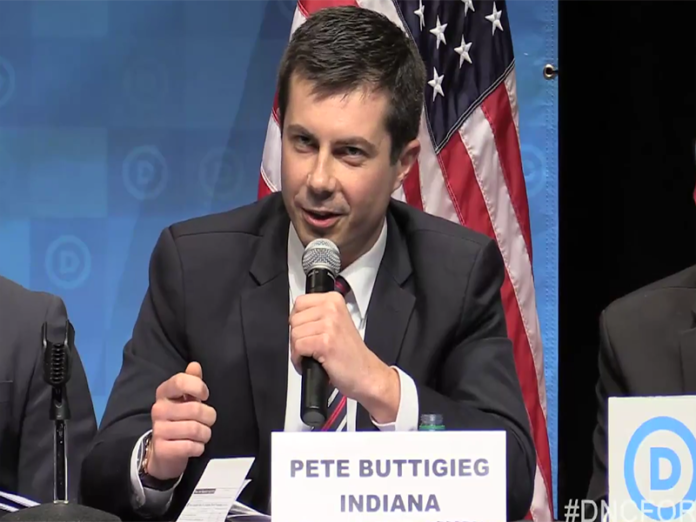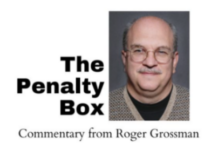Jonah Burrell first contributed to Pete Buttigieg’s campaign after watching the first prominent openly gay presidential candidate on television. When Burrell later saw him in person in a cramped upstate South Carolina auditorium, he knew he had to do it again.
“I felt compelled to help,” Burrell, a nursing student who is gay, said after the event. “It makes me proud he’s a gay man.”
Financial support from the LGBT community has helped Buttigieg defy expectations by raking in more than $7 million in just over two months. The money has come from grassroots supporters like Burrell and big-dollar Hollywood donors who hope Buttigieg will make history — or at least the summer debate stage.
The Buttigieg appeal was on display again this weekend when the mayor of South Bend, Indiana, and his husband separately headlined galas for two of the country’s largest LGBT organizations.
And the early haul shows no sign of slowing. Victory Fund, which invested $2 million in LGBT candidates in 2018, expects to endorse Buttigieg shortly after he formally joins the race, President and CEO Annise Parker said.
The board that makes endorsements — made up of 100 “bundlers,” or people who commit to raising $5,000 annually for candidates — has been “champing at the bit” to endorse him, she said. Once they do, the group will appeal to its donor network to directly support Buttigieg’s campaign and promote his events.
Of the candidates who’ve released their first-quarter fundraising totals, Buttigieg outraised New Jersey Sen. Cory Booker and Minnesota Sen. Amy Klobuchar, who each brought in over $5 million, and entrepreneur Andrew Yang. Other candidates exceeded his total, including California Sen. Kamala Harris ($12 million) and Vermont Sen. Bernie Sanders (more than $18 million). But they are better-known, with well-established donor networks that in some cases date back many years.
Buttigieg says he’s using the money to double his roughly 20-person staff and build teams in early-voting states likes Iowa and New Hampshire.
While his upstart campaign benefited from the gay community’s support, he didn’t rely on it. Buttigieg says he received donations from nearly 160,000 people between late January and March 31. About 65% of contributions were less than $200, with an average donation of about $36.
“It certainly helps to have people who are excited about the historic quality of a possible candidacy, but we really have a broad range,” he said. “They’re still crunching the numbers to understand some of the dimensions of all our support because it came, it seems, from every corner of the country and very different types of donors.”
Parker said while there’s “huge excitement” among the gay community, the man known to many as “Mayor Pete” is catching on with all kinds of people she meets while traveling the country.
“One of the most astounding things about Pete’s candidacy is that it’s not the LGBTQ community alone that’s fueling it,” she said. “The average guy says ‘that Mayor Pete guy, he makes sense. He’s smart, he’s thoughtful, he’s the kind of guy we ought to have as president.’ It has nothing to do with whether they will ultimately vote for him. But they want him to be out there.”
“He’s not a gay candidate for president,” she added. “He is a candidate for president and part of his life experience that he brings is being an openly gay man. And you know, an openly gay first man.”
Buttigieg often campaigns alongside his husband, Chasten. He talks about how important their marriage is, sometimes taking aim at Vice President Mike Pence, who as Indiana governor signed a “religious freedom” bill decried as anti-gay.
Meanwhile, Chasten Buttigieg has developed a following of his own on Twitter and the campaign trail. On Saturday, he was the featured speaker at the Human Rights Campaign Houston gala, where he thanked the group for its support when he was an 18-year-old who left home after coming out, and for helping him potentially become “the first man in history to pick out the White House china.”
He also talked about violence against transgender people, particularly black transgender women, and the importance of passing the Equality Act, a sweeping LGBT-nondiscrimination measure.
“We need someone in the White House who will sign the Equality Act into law,” Chasten Buttigieg told the cheering crowd. “Luckily I know a guy.”





